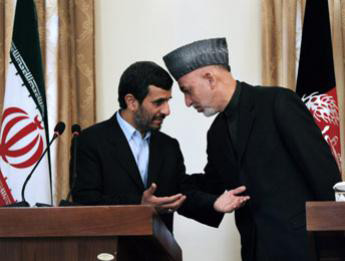By Maria Abi-Habib
KABUL—Afghanistan's election authorities are being pressured by President Hamid Karzai and by Iran to alter the preliminary results of September's parliamentary races, adding new controversy to a fraud-marred election, officials and candidates say.

Iran exercises heavy influence over the Afghan government, a power that became apparent with recent disclosures by Mr. Karzai that he regularly receives bagloads of cash from Tehran. (Photo: Reuters)
In a meeting this week between Mr. Karzai and Afghanistan's two official election bodies, the president, who is a Pashtun, pushed for more seats to be allocated to Pashtun candidates, Afghan officials say.
According to a preliminary tally, the Pashtuns, Afghanistan's largest ethnic community, lost at least 20 parliamentary seats to other groups, an outcome that is stirring up ethnic tensions. In the Pashtun-majority Ghazni province, for example, all the 11 elected lawmakers belong to the Hazara ethnic minority because insurgent activity derailed the vote in most Pashtun areas. In the previous parliament, Pashtuns held six Ghazni seats.
Following Mr. Karzai's meeting with election authorities, Afghanistan's attorney-general's office launched an investigation Thursday into allegations that officials at the Independent Electoral Commission were complicit in fraud. Fazel Ahmed Manawi, head of the IEC, said the attorney general has no authority to interfere in election affairs, according to remarks broadcast on the Tolo TV network.
The IEC and the separate Electoral Complaints Commission can disqualify candidates and votes.
Probably the most controversial disqualification so far, on orders of the ECC, is that of Nisar Faizi, a self-described "pro-America" candidate who won the fourth highest number of votes nationwide, and was the top vote-getter among 17 winners in the western Herat province bordering Iran. He blames the ECC decision on Iranian interference. The ECC officials deny the claim.
Iran exercises heavy influence over the Afghan government, a power that became apparent with recent disclosures by Mr. Karzai that he regularly receives bagloads of cash from Tehran.
The list of preliminary winners for the 249 seats in the Wolesi Jirga, the lower house of parliament and a key check to Mr. Karzai's authority, could change substantially when the final results are approved by the ECC and the IEC.
In roughly two weeks, the ECC has disqualified five candidates and says more disqualifications will be announced before final results are released at the end of the month.
Some of these disqualifications have been announced with no evidence or explanation publicly shared by the ECC, independent election monitors say.
"The ECC has to be very transparent; that's the challenge they struggle with every day," says Andy Campbell, the Afghanistan director for the National Democratic Institute, which monitored the Sept. 18 polls.
Mr. Faizi's case has gained particular notoriety. The ECC says Mr. Faizi was disqualified because he failed to comply with a law that bars government employees from running. It says he never resigned from his government post as an adviser to Herat's electricity department. The ECC also said Mr. Faizi forged documents, including one supposedly bearing the signature from the acting minister of electricity and former Herat warlord, Ismail Khan, certifying that Mr. Faizi hasn't received a state salary in two years. The Wall Street Journal viewed copies of the documents. A spokesman for Mr. Khan didn't reply to numerous queries about whether the signed document is genuine.
Mr. Faizi says he is a victim of government officials allied with Iran. "Iran is worried that I'll support U.S. policy in parliament, as I support the U.S.'s activities in Afghanistan, not Iran's," he said in an interview.
Ahmad Zia Rafat, the ECC spokesman, said the body will stick by its decision. He denied that the ECC has been pressured by Iran or powerful government officials, including Mr. Karzai.
Mr. Faizi, a businessman who holds American citizenship and lived in Virginia for 11 years, importing Afghan goods, won with more than 17,000 votes, beating his closest opponent by about 7,000 votes.
Although Mr. Faizi says he believes Mr. Karzai has nothing to do with his disqualification by the ECC, dozens of other candidates accused the Afghan president of interfering in elections to provide illegal government support to preferred candidates.
The Iranian Embassy in Kabul didn't respond to requests for comment about Mr. Faizi. Spokesmen for Mr. Karzai were unavailable when called.
On Wednesday, hundreds of candidates took to Kabul's streets denouncing the election as fraudulent and calling for new polls to be held.
"This wasn't a fair and free election for the Afghan people," said Noorolhaq Olomi, an incumbent from southern Kandahar province participating in the protests.
"Iran is engaged in a cold war against America and Europe, and trying to attack them through Afghanistan. If their people get seats in the parliament, they can implement Iran's programs and aims," complained another candidate, Malalai Shinwari, an incumbent from Kabul who lost the election.
In the August 2009 presidential elections, a quarter of the ballots cast, most of them for Mr. Karzai, were thrown out by the ECC and IEC on grounds of fraud.
This year's parliamentary elections also have been tainted by fraud, with 1.3 million ballots thrown out last month by the IEC and more expected to be disqualified by the ECC.
Meanwhile, in southern Kandahar province Thursday, the province's deputy literacy department head was shot dead by unknown gunmen, a spokesman for Kandahar's governor said. Taliban insurgents have launched an intimidation campaign against Afghans working with the government, assassinating scores of public servants in Kandahar alone recent months.
—Habib Khan Totakhil and Arif Afzalzada contributed to this article.



